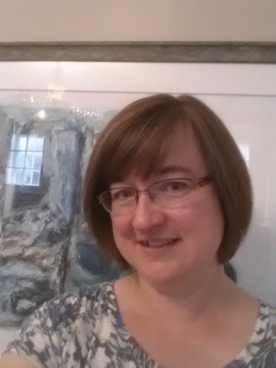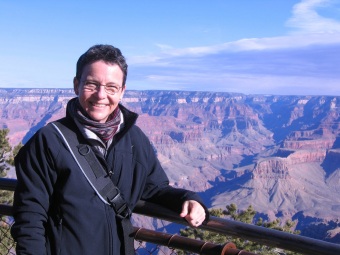By Sarah Simpkin
In this column we’ll be featuring interviews with local library, archives and museum staff and students. Our fifth interviewee is Esenia Jubea.
Who are you?
I’m Esenia Jubea, Information Resource Coordinator at the National Capital Commission. I started working with NCC about two and half years ago. It started as a three-week field work placement during my Library and Information Technician diploma at Algonquin College, and they’ve kept me on to work on special projects ever since!
What kinds of projects?
My first one was my pride and joy! I worked to build a Digital Photo Catalogue for the NCC architects, meant to help them search, easily locate and download photos of previous projects. After just seven months the archive contained more than 39 thousands photographs. I’ve prepared a slide collection for transfer to Library and Archives Canada, and also worked on transferring information to Heritage Canada. My current position is split between two roles, but I’m still within the same department. I spend half of the day in the service centre managing the business information and helping our clients search for it. The other half of the day I am support the administration of our Enterprise Content Management System (ECM). Our physical and electronic documents are managed through this system.
Wow, sounds like a wide range of tasks! How did Algonquin College prepare you for this work?
The program gave me the main skills for getting into both library and information management roles. Most importantly, though, they taught me how to learn. The program really encouraged me to keep learning. I especially enjoyed taking database-related courses, and was happy to discover that I would keep working with them on the job.
How did you discover the program?
I wasn’t sure which program to take at first, but Algonquin’s career counselling staff was very helpful. I researched the job market in Ottawa, and realized just how many information management jobs exist in all kinds of organizations. I had a great mentor in Helena Merriam, the program coordinator. I also had the fortune to meet my current supervisor early on. Lindsay Stephenson has taught me so much — I’m still learning so many things from her and from the rest of the NCC team. It’s a very supportive and friendly work culture.
Helena mentioned that you grew up in Moldova.
I immigrated to Canada from Moldova seven years ago. I can’t believe how much has happened in that time. I’ve studied two languages, completed my diploma, found work in my field, and had my second child! I’ve fallen in love with this country. I’ve met some amazing people and felt very supported.
How do you like working for the NCC?
I enjoy it enormously! I’m only a small part of the team, but I’m very proud to the work that we do, and I’m happy that I’m able to contribute to keeping the National Capital Region as a source of pride for Canadians. Our work culture is very positive. People are very friendly and collaborative, team-building is very important to them, and the corporation provides a lot of learning opportunities for staff.
Do you have any advice for people considering the Library and Information Technician program at Algonquin College?
The program provides so many opportunities to see what library and information management work is like. Field placements are so important, and can lead to permanent jobs. They allow you to get a taste of the work. Practical experience working in those environments is so valuable. I also encourage students to meet as many people as possible. Don’t be shy! Show your enthusiasm!
It sounds like interpersonal skills are very important.
They really are. It’s not just about working with information — people are a big part of the process too. My favourite part of the job is being able to bring the right information to the right people at the right time. It’s so rewarding when I help someone find exactly what they were looking for.
Who should I interview next?
I think another ‘Reliable Source’ should be Priyanka Sabnany. She is working as a Library Technician for the Ottawa-Carleton District School Board. I met her while volunteering at my children’s school. You will be amazed to hear her story — especially the part about building the Chapman Mills Public School Library from scratch.



